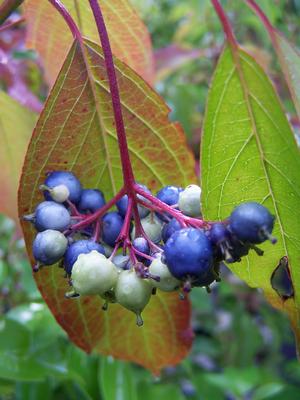View All Plants :: View All DECIDUOUS SHRUBS :: View All POND & WETLAND PLANTS
Cornus amomum
Silky Dogwood
Plant Type:
DECIDUOUS SHRUBSCornus amomum – Native Silky Dogwood sports yellow-white flat-topped cymes in May/June over medium green foliage. Gorgeous porcelain blue fruits follow in fall occurring with bronze to bronze-purple foliage. Winter stem color is a ruddy reddish-purple and olive green – not knockout winter interest but not bad either! Site Silky Dogwood in a spectrum from full sun to mostly open shade exposure planted in fertile moisture-retentive soil. These will arrive pruned down - they are too tall to ship economically... handsome and tough they will be set to go in the garden, wild garden, woodland edge, wildlife hedgrow or wherever your heart desires. Cutting grown.
Please scroll down to Genus Overview for more information.
Characteristics and Attributes for Cornus amomum
Season of Interest (Flowering)
- Spring
Season of Interest (Foliage)
- Spring / Summer / Autumn
Interesting Bark
- Colored
- Smooth
Autumn Interest
- Autumn Leaf Color
- Fruit / Berries / Seed Heads
Nature Attraction
- Butterflies
- Songbirds
- Honey Bees & Native Bees
Light
- Sun Tolerant
- Shade Tolerant
Attributes
- Hedgerow
- Woodland
- Marginal
- Wildlife Garden
- Shrub Border
Growth Rate in the Garden
- Moderately Fast
Soil
- Fertile
- Moist
Origins
- Eastern North America
Propagated By
- Cutting Grown
Genus Overview: Cornus
Cornus. The Dogwoods come in many sizes – low growing shrubs to rounded trees. They are indispensable in a garden with almost all species and cultivars sporting four seasons of interest. Many exhibit richly-colored winter wood, attractive flowers and pretty berries in blue or white. Most offer terrific fall foliage color. The cultivars that offer gorgeous winter bark are especially well-used as background to lower growing evergeens or as foreground shrubs set before conifers, their stem colors glowing in winter against a backdrop of green, black-green, yellow or blue. All that produce flowers and fruit are very fine choices for the wildlife enthusiast. The trees provide nesting spots. When shrubs are grouped together these also provide nesting opportunities for some species of sparrows and even catbirds among others. The trees and shrubs provide nectar for bees and many other pollinators when in flower. Birds relish the late season fruits. All prefer fertile soils that retain some moisture between rain events. All of our offerings are cutting grown.


